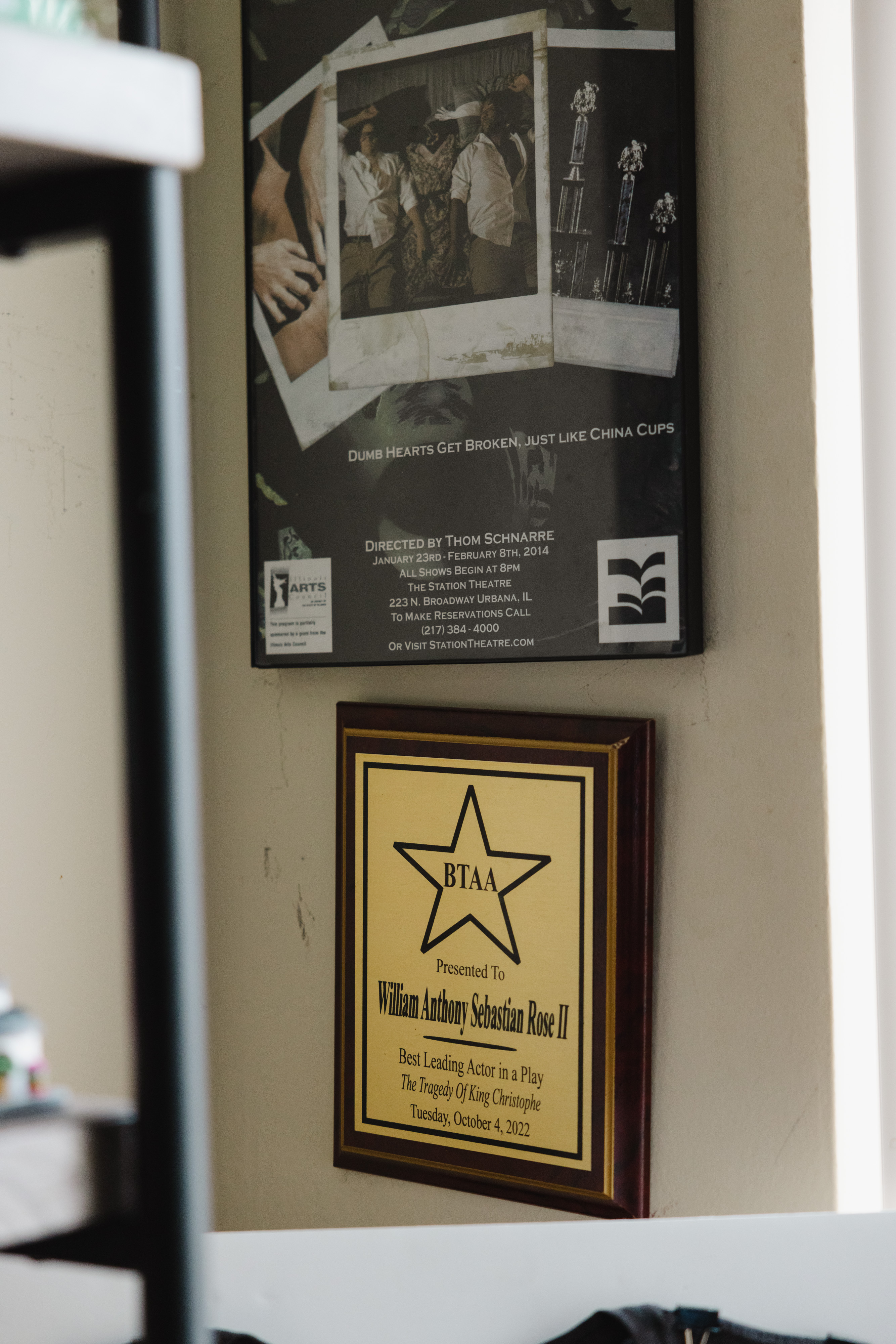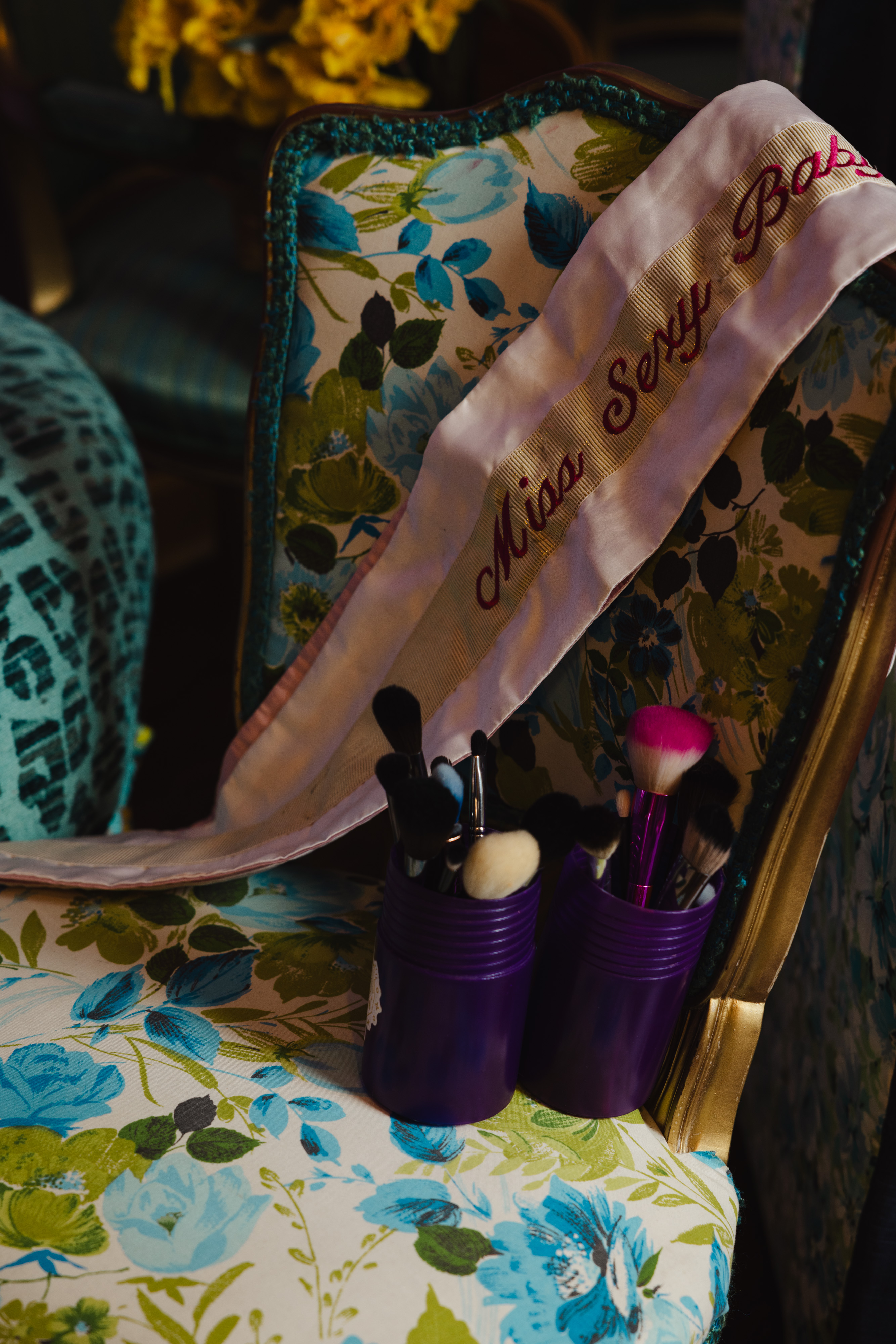William Anthony Sebastian Rose II wraps a show at Lake View’s Theater Wit at 10 p.m. on a weeknight, winds through the tight lobby greeting audiences and heads for the door. He has a 9-to-5 job the next morning.
Chase Wheaton-Werle, an actor, playwright, and current ensemble member of Factory Theater in Rogers Park, calls me from work. Not theater work — but from his job at an insurance company. He swings his laptop around to show me the view of the city from the downtown office lobby where he sits during our lunch break call. For Wheaton-Werle, who is married to a non-Equity director, this job makes acting and playwriting possible.
Sydney Genco, who performed in Kokandy Productions’s award-winning The Spongebob Musical, also works as a makeup designer to make ends meet. Last season, she acted in four shows and designed eight.
Each of these three actors is arguably at the top of their game, having just earned awards at Chicago’s most prestigious theater ceremony: the Non-Equity Jeff Awards. As non-Equity actors (performers who are not members of the Actors Equity Union), they are the lifeblood of Chicago’s internationally feted storefront theater scene. But for the artists currently performing in the storefronts, making a living is not easy. In fact, recent industry data indicates that it is getting harder.
“I love acting. It is my passion. It is my drive. But it is a struggle,” said Rose, who starred as Tambo in Refracted Theater Company’s 2023 production of Tambo & Bones, which led this year’s Jeff awards with eight honors. “It sounded so romantic when I was a kid, you know, the life of the struggling artist. You’re starving, but you’re breathing and you’re living through your craft and it’s really cool. It’s awesome until you’re in it.”
COVID-19 walloped the performing arts by drying up audiences and the ticket revenue that comes with them. Much of the attention on saving the arts has been focused on getting those audiences back. But the crisis has obscured a vital data point that is apparent in new research from the National Endowment for the Arts, which is the largest arts funder in the country. Their data show the lifeblood of the performing arts sector — its talent — is earning less.
Sunil Iyengar, director of the office of research and analytics for the group, said that even before the pandemic, many performing artists earned wages and salaries well below the national average. “When COVID hit, it was a seismic shock to the sector,” said Iyengar. “Whether you measure it by economic output by these organizations, performing arts organizations took a major tumble, but then if you also looked at jobs, they were cut very severely.”
But even as the industry has started to climb back from COVID shut downs, Iyengar said wages and salaries for performing arts workers are lower than in 2019.
According to Iyengar’s national data, in 2020, the median wage for an actor was $21.88 per hour. By 2023, that median wage had dropped 6% to $20.50 per hour. (Illinois-specific analysis was not yet available.) In Chicago, several non-Equity actors said that can mean being paid a one-time stipend of $300 to $500 for six weeks of work on a storefront show.
View this post on Instagram A post shared by The Factory Theater (@factorytheater)
WBEZ spoke to storefront performers from around the city about their experiences in non-Equity theater. And while wages were a concern, the outlook wasn’t all gloomy. While some commercial theaters have tried to combat the decline in audience by leaning into reproductions of popular shows that are familiar with audiences, many storefronts have gone the opposite route — taking artistic risks on fresh and unique stories in the hopes of luring audiences curious about new works and creating space for more diverse storytellers.
Chicago also continues to offer actors plenty of variety, from stage opportunities to voiceovers to guest spots in shows like Chicago Fire, Med and P.D., which were again renewed by NBC this year.
“I made a conscious decision to stay in non-Equity knowing that it was never going to financially support me,” said Genco. “The storefront theaters were widely varied in their budgets, but they were doing the interesting work that I wanted to see and that I wanted to be a part of.”
And the community is quick to help each other – Wheaton-Werle says he got his insurance job from a recommendation from another creative.
While all were passionate about their craft, most said you have to work day jobs to survive.
Corporate connections
Rose is fresh off a role that earned him a Jeff Award for performance in a principal role. The talented actor is now a lead in Inanimate at Theater Wit, and right after that wraps, he will head to Florida for his next acting gig. Needless to say, he’s busy.
But even an in-demand actor like Rose has to work. He’s landed an administrative job with a local university that supports his acting. Early on, he couldn’t afford a car, which meant long commutes between his home in Oak Park, his job in Naperville and his first show at Citadel Theater in Lake Forest.
“So I was getting up at 4 a.m. to make sure that I got to the bus, to then get to the train, to make it out to my office in Naperville,” Rose recalled. “Then, I got on the bus, to get to the train to get out to the theater. Then I’d get home after rehearsal between midnight and 1 a.m., and then I’d get up and do it all again.”
Rose remembers keeping that up because he wanted to be an actor so badly. For him, this was living the dream of being an artist. The struggle was baked in.
But now, he has found a sustainable balance between his two lives. A current supervisor at his day job understands that he is also an actor and needs flexibility to rehearse and perform. Conversely, there are moments during breaks at rehearsals where he can jump on a computer and finish some work.
The corporate day job has also made it possible for Wheaton-Werle and his wife, Becca Holloway, to make ends meet. Holloway is a director and ensemble member at Factory Theater and casting director at Red Theater.
Wheaton-Werle’s job provides both steady income and health insurance that go a long way toward making life sustainable for the creative couple. But the road has still been a little bumpy.
“We live in a very tiny one bedroom apartment,” said Holloway. “Luckily our landlord takes care of us, and our rent hasn’t gone up. But because of that, our lifestyle also hasn’t really changed. So we’ve had to make sacrifices; we’ve had to really budget.”
The many hats approach
For Genco, an ensemble member and company manager at LGBTQ-focused Hell in a Handbag Productions, the key to survival has been multiple theater skills. She acts and works in makeup design, and looks for productions where she can do both.
“I am definitely more interested in new works and off-the-beaten path things,” said Genco, who has been in Chicago storefront theater since 2007. “As a musical theater performer, I have absolutely zero interest in doing Hello Dolly and The Music Man for the rest of my career, even though if I did that, that would pay my bills.”
Genco, whose father is an entrepreneur, said college professors advised her to have more than one skill.
“I had noticed that this drag parody theater company was hiring a makeup designer for their photoshoots and their pre-production images,” said Genco. “So, I said, ‘You know, I’m pretty good at makeup. I think I could do that.’ ” So she went back to school and learned the art and business of makeup design.
Claire Kaplan, who played the lead role in About Face Theatre’s The Brightest Thing in the World this spring, has also leaned on a second skill to survive. She teaches theater at the University of Illinois Chicago.
“The cool thing is, for the last few months, I have been doing all art jobs,” Kaplan said. “Which is amazing and doesn’t happen very often in my life at all. I was teaching at UIC, I was directing a Shakespeare clown show for Theater Unspeakable, and I was acting at About Face. So, I was working seven days a week, but it was all art.”
Running the show
Brittany Ellis came to Chicago 15 years ago with hopes of not only acting, but creating theater. She was the founding artistic director of Wayward Productions, which she operated in Chicago for five years, before shutting down. Ellis said she loved her company, and they had success, but non-Equity theater is “hard to produce on your own”.
“We made our own props, we shopped for our own locations,” said Ellis. “It’s the highest form of craftsmanship, building a show out of nothing. With a $0 budget and whatever you can pull together from the thrift store and a hot glue gun.”
Ellis is now an actor who supplements her income with a corporate job. But she’s still a firm believer in the magic of storefronts — even if it can be a tough gig. The reality can be low wages, low budgets, and a high likelihood that as a performer, you will need to generate additional income to survive.
But artists who frequent storefront stages expressed a common theme: deep love for the craft.
“I love what I do,” said Rose. “I love going on stage and having that moment when you can see in the audience that they really get into a show. You can almost feel it. Like there’s a breath, a communal breath in the room where everybody goes, ‘Oh, OK. They’re about to do something.’”
“I live for that.”
Mike Davis is WBEZ’s theater reporter.















